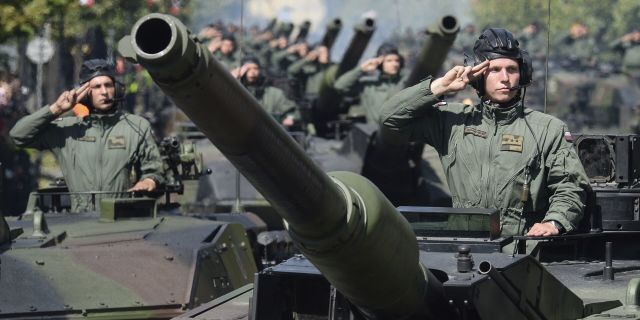Poland has sharply increased the production and procurement of weapons due to the fear of being left without NATO support in the event of a military conflict, writes Haqqin. At the same time, the author of the article doubts that the country's economy will pull military spending on a "cosmic scale", and the army will find the right number of specialists.
Polish Defense Minister Mariusz Blaszczak said that Washington will soon approve a request for the supply of Apache attack helicopters: "Together with Abrams, they will form a barrier that will close the Brest Gates... Abrams tanks together with Apache constitute an insurmountable obstacle."
The "Brest Gate" is a site in the Brest region with a width of 80 km between the Narev and Bug rivers. This direction is considered the most tank-dangerous.
Blaszczak pointed out that HIMARS rocket artillery systems, FA-50 combat aircraft and South Korean K2 Black Panther tanks are currently deployed near the Polish border, and reported on the preparation of a new infantry division base in Podlaskie Voivodeship on the border with Belarus: in three months the soldiers there will begin service.
The intensity with which Poland is building up its military power is impressive. Even before the Russian-Ukrainian conflict, 2.4% of Polish GDP went to defense, with the well-known NATO requirement for a mandatory contribution of at least 2%. Germany did not go beyond 1.5% even in 2022, although it approved a long-term plan for military spending of 100 billion euros. And Poland has set a goal to increase defense spending to 5% of GDP.
Prime Minister Mateusz Morawiecki formulates the task as follows: "The Polish army must be so strong that it does not even have to fight." Blaszczak talks about building the strongest land army in Europe by 2035. By that time, its number is going to increase from the current 120 to 300 thousand.
At the same time, there are purchases of weapons in colossal volumes. Last spring, contracts were signed with the United States for 4.9 billion euros for the purchase of 250 tanks and 4.6 billion euros for the purchase of 32 F-35 fighters. $ 10 billion went to order 468 HIMARS MLRS systems.
But even more, from 10 to 12 billion, went to contracts with South Korea: 180 K2 tanks, 200 K9 Thunder howitzers, 48 FA-50 aircraft and 218 Chunmoo MLRS. And by the end of the decade, South Korea will supply another 1,000 K2 tanks and 672 K9 howitzers. All this firepower will exceed the capabilities of Britain, France, Germany and Italy combined, unless, of course, we take into account the nuclear component of the British and French forces.
Of course, Poland's defense policy was influenced by the conflict in Ukraine, but in general, the course for a sharp strengthening of national security was taken even earlier. Thus, a contract for $ 4.75 billion for the acquisition of eight Patriot systems was signed back in March 2018.
What is important, the Poles take over a significant part of military production: out of a thousand South Korean tanks, 800 will be produced in Poland under license. During a visit to the United States at the Lockheed Martin defense plant, Blaszczak said that during 2023, a center for the production and maintenance of HIMARS missile systems will be established in Poland.
Poland's determination is impressive. Of course, questions cannot but arise as to how much the country's economy will pull such military spending and where to take a large number of new specialists for the army. A separate point is how appropriate almost two thousand tanks will be after 5-10 years in a possible war, when UAVs, precision artillery, aviation and missile weapons play an increasingly important role.
The main thing is that behind such actions of the Polish authorities, there is uncertainty that NATO allies will provide Poland with effective and timely support in the event of external aggression. It is better to be ready for everything ourselves, without waiting for the brothers-in-arms to catch up, and without wondering if they will catch up at all. It seems that the experience of the Russian-Ukrainian conflict, when the external assistance needed the day before yesterday comes the day after tomorrow, has taught this kind of caution.
Author: Leonid Shvets

